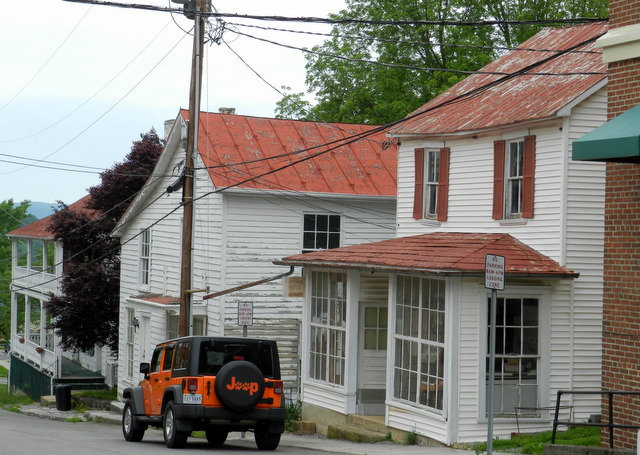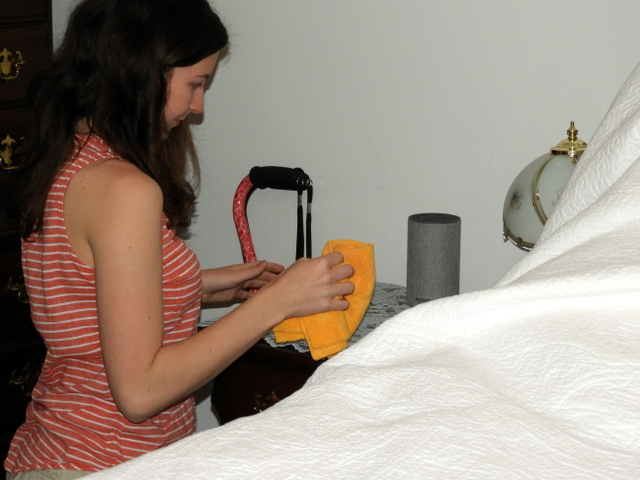Given the horrors of this administration, I can understand the owner's desire to have the woman leave.
To hell with the U.S. Constitution, right?
Some people are very happy with the current state of affairs and that is their right. I hope that time proves me wrong about what I think of things. I always hope that with people in power, that I am proven wrong when I think they are doing bad things.
Generally, I am proven right. But only Time knows that; people have short memories, they twist events to suit themselves, the outcomes ultimately only matter if blood is spilled, and usually not even then. To be sure, at this stage, right or left, it's my opinion that we have all lost.
I don't know what I would do if I owned a restaurant and persons with whom I vehemently disagreed wanted to come in. I don't particularly like to deal with "the public," which is why being a news reporter suited me. I attended thousands of public events, but I was like a small bee. I was the invisible observer, polite if spoken to, otherwise obscure. I listened attentively if someone sought me out so I could hear their point of view, whether or not I agreed. It was up to me, later, to decide if I wanted to let their words find a larger voice (I usually did, because I am a professional and that was what professionals did.). Sometimes what they said was all blather and did not pertain to the issue at hand. I listened anyway because you never know when one thing will lead to something else. And since I was a reporter, and doing research, I freely spoke to folks when I wanted to, if I thought they had something interesting to say or something to add to the story.
For me, it was all about the story. It wasn't about opinion, power, or political sides. It was about facts, and that was all I cared about.
There was this one time, though, when I turned down hot dogs. You'd have thought I had done the unthinkable. Perhaps back then it was. It stands out in my mind because I think it is one of the few times I walked away from a story for personal reasons.
The year was 1997. It was August, and hot. Candidate Jim Gilmore, who would that November win the Virginia governor's seat and who in 2008 ran for President of the United States, was stumping in Craig County (population 4,950 about that time).
I was the freelance reporter who was covering Craig County for the little tiny weekly paper. I was paid somewhere around $25 a story, plus mileage, so I tried to get three or four articles at a whack every time I drove over there. Otherwise it simply didn't pay because New Castle (the Craig County seat), like Lexington, is 45 minutes away.
So on this hot August day, maybe around 11 a.m., I showed up in downtown New Castle to take a photo of Jim Gilmore roaming around shaking hands, and write up a little something about his visit.
I was the only media there. No TV reporters with cameras, no daily newspaper reporter. Nobody with a cellphone with a camera because those hadn't hit mainstream yet. There was just me with my little notebook and my Nikon FG-50 film camera.
Mr. Gilmore was accompanied by three men, his handlers, I suppose we would call them today. They had on dark black suits and sunglasses, and looked sweaty in the broiling sun. They were loud, boisterous, misogynistic, and racist. They called me "little lady reporter" and offered suggestions for photos, as if I hadn't been doing this for 12 years by that time and couldn't figure out a good angle for a picture. They whispered quotes into Mr. Gilmore's ear about the charm of the historic venue. One of them snickered about the fact that New Castle was once a "sunset town" - that is to say, there was a sign there, taken down during my life time, that threatened black people if they were caught in the county after dark. (Not long after Mr. Gilmore's visit, the KKK had a party over there, too, and then someone burned a cross in the yard of a man who was housing a black person. I refused to write those stories, too. Not for $25.)
These busy important fellows also all smoked cigarettes and threw the butts into the street, grinding the cancer sticks beneath the heels of their expensive shoes. They left their litter on the sidewalk.
They stunk in every sense of the word, these men.
When they headed for the little hot dog restaurant that used to be in town, one of them asked me if I'd like to join them for lunch. "You know, get an exclusive," he said. Wink, wink.
"No thank you," I said. "I have all I need."
With that I walked off, trying not to double over laughing at their slack jaws. I don't think anyone in the media had ever told them no before. I heard them talking as I walked away. "Can you believe that?" one of them said.
Maybe it was a missed opportunity. I could have written the greatest piece ever about the soon-to-be governor and how he loved chili and called the cook the best hot dog maker in the state. Or perhaps I could have overheard him say something like his cohorts did, something callous and racist, and printed it. It would have been in a newspaper that less than 2,500 people read, at a time when there was no Facebook, no Twitter, no social media. Maybe the daily newspaper would have picked it up, but I doubt it. They paid little attention to that area of their readership.
So I walked away, leaving Gilmore's handlers surprised and confused because the media - i.e., me - spurned them. They thought, I'm sure, that I was doing a poor job. What they didn't know was this: I was only being paid $25 and I had the story I was being paid to write. These men were jerks, they were smoking cigarettes, and I have asthma. I also thought Mr. Gilmore was insincere and I knew his "no car tax" mantra would ultimately fail if the legislation passed because I'd talked to two different commissioners of revenue who had done the math and shown me how it would never work. (The legislation passed. It destroyed Virginia's rainy day fund and we're still paying the car tax to this day. So much for slogans.)
So why would I go eat a hot dog with these people?
That was how I handled something I didn't want to deal with. I walked away from powerful men who were talking down to me, who were making fun of the community I was covering, and who were about as black-hearted as a vulture looming over the fence hungrily gazing at a dead deer. I've been a reporter for a long time. I can size people up fairly well.
Today? Today I'm older. Hopefully wiser. Would I do it differently now? Now I wouldn't even take the job. And if I took the job, I still wouldn't go eat a hot dog with chain-smoking, self-righteous braggarts who thought I owed them something simply because they existed. The only thing I might do differently is be more insincerely apologetic and say I had a previous engagement or something, simply because of social media. (Social media sucks but the reality is I wouldn't want some dude tweeting "news reporter just walked away from exclusive. What a bitch!")
After all, turning your back and walking away from someone is, in itself, a special form of power. It's a power we all have, if we only think to use it.
Throwing someone out of your restaurant is another form of power, similar to turning your back. Good or bad? Your guess is as good as mine.

































